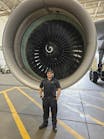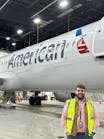A4A: U.S. Airlines are Taking Action to Improve Customer Service
WASHINGTON, May 4, 2017 – Sharon L. Pinkerton, senior vice president for legislative and regulatory policy at Airlines for America (A4A), the industry trade organization for the leading U.S. airlines, testified before the Senate Commerce Committee, demonstrating that carriers are listening to the traveling public and taking action to improve the travel experience for every passenger who takes to the skies.
In her testimony, Pinkerton addressed the recent unacceptable failures in customer service, and how the U.S. airline industry is ready to deliver on its responsibility to implement meaningful solutions to ensure such incidents never happen again. Carriers take their commitment to customer service seriously and have proactively implemented systemic reforms – ranging from changing overbooking policies to enabling front line employees more discretion in managing specific situations – to improve customer service. In addition to the reforms already implemented, each carrier continues to review a wide array of customer service polices, and efforts are underway to provide passengers more transparency and understanding about their rights as consumers.
“U.S. airlines are focused and committed to treating every passenger with the respect and dignity they deserve,” said Pinkerton. “Airlines recognize that the onus is on us to foster a customer-centric environment. We commit to our passengers – and the members of this committee – that U.S. airlines will continue to work and invest in our ultimate industry goal of providing a safe, efficient and enjoyable travel experience each and every day.”
Seven examples of concrete steps being taken by A4A member airlines to improve customer service include:
1. Completely eliminating or reducing overbooking;
2. Prohibiting use of law enforcement to remove passengers from a flight, except in cases of safety or security;
3. Ensuring that no passenger is involuntarily removed from a flight for another passenger;
4. Ensuring that crews traveling must be booked at least 60 minutes prior to departure;
5. Giving gate agents the discretion to offer higher amounts of money as an incentive for customers to voluntarily take a different flight;
6. Airlines are renewing their focus on training for all customer-facing staff to make sure they are taking care of passengers, not just getting them from point to point; and
7. Efforts are underway to provide passengers more transparency and understanding about what their rights are as consumers.
In addition, Pinkerton noted that carriers have made progress, establishing a solid foundation to further build on without government interference. The American Customer Satisfaction Index Travel Report recently validated some key metrics that demonstrate improvements in the flying experience: better online web booking, improved check-in process, timely text alerts informing passengers and innovative baggage handling technology.
Consumers and communities across America have seen enormous benefits from a thriving and competitive aviation marketplace:
- According to the Bureau of Transportation Statistics (BTS)
- The fourth-quarter 2016 average airfare was down 26.5 percent from the average fare in 2000, the highest inflation-adjusted fourth-quarter average fare recorded in the 21 years since BTS began collecting air fare records in 1995;
- Since 1995, inflation-adjusted fares declined 23.4 percent.
- U.S. Airports of all sizes have realized air service gains over the past two years with 176 Small- and Non-Hub markets seeing available seat numbers grow;
- Airlines added 198 new U.S.-based routes in 2016 and have added 151 more in 2017. Over two years, flyers have seen a net expansion of 54 nonstop routes to/from U.S. airports.



